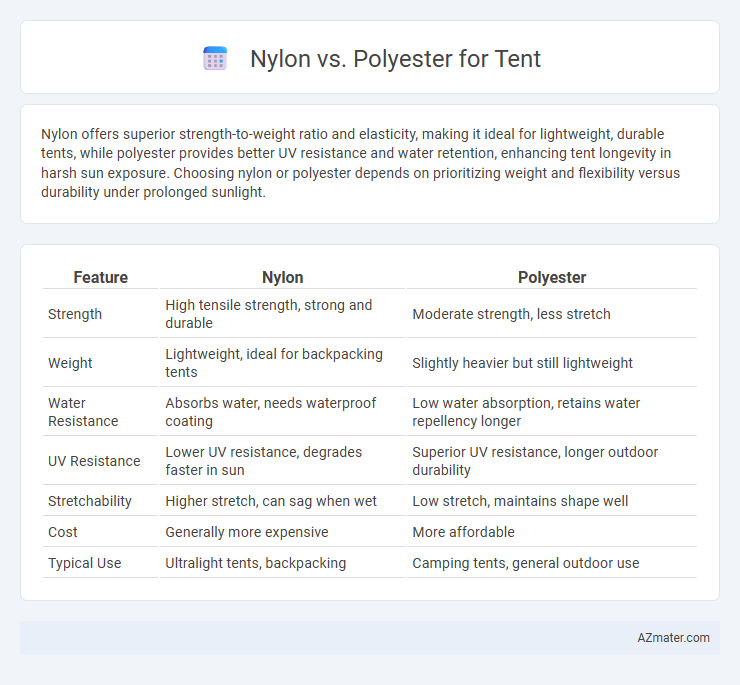Nylon offers superior strength-to-weight ratio and elasticity, making it ideal for lightweight, durable tents, while polyester provides better UV resistance and water retention, enhancing tent longevity in harsh sun exposure. Choosing nylon or polyester depends on prioritizing weight and flexibility versus durability under prolonged sunlight.
Table of Comparison
| Feature | Nylon | Polyester |
|---|---|---|
| Strength | High tensile strength, strong and durable | Moderate strength, less stretch |
| Weight | Lightweight, ideal for backpacking tents | Slightly heavier but still lightweight |
| Water Resistance | Absorbs water, needs waterproof coating | Low water absorption, retains water repellency longer |
| UV Resistance | Lower UV resistance, degrades faster in sun | Superior UV resistance, longer outdoor durability |
| Stretchability | Higher stretch, can sag when wet | Low stretch, maintains shape well |
| Cost | Generally more expensive | More affordable |
| Typical Use | Ultralight tents, backpacking | Camping tents, general outdoor use |
Introduction to Nylon and Polyester Tents
Nylon tents are lightweight, durable, and highly resistant to abrasion, making them ideal for backpacking and hiking adventures. Polyester tents offer excellent UV resistance and maintain shape better in humid conditions, providing long-lasting performance in diverse weather. Both materials are commonly used in outdoor gear due to their water resistance and strength, but selecting between nylon and polyester depends on specific camping needs and environmental factors.
Material Composition and Structure
Nylon tents are made from polyamide fibers, offering high tensile strength and excellent elasticity, which enhances durability and resistance to tearing. Polyester tents consist of polyethylene terephthalate fibers, providing superior UV resistance and minimal stretch when wet, making them stable in various weather conditions. The denser weave of nylon allows for a lighter, more compact tent, while polyester's structure contributes to longer-lasting fabric under prolonged sun exposure.
Durability and Strength Comparison
Nylon tents offer superior tensile strength and elasticity, making them highly resistant to tears and abrasions, especially when coated with polyurethane or silicone for added durability. Polyester tents exhibit excellent UV resistance and maintain shape better under prolonged sun exposure, which enhances long-term durability in harsh outdoor conditions. For high-strength and lightweight applications, nylon is preferred, while polyester provides enhanced weather resistance and dimensional stability.
Weight and Packability Differences
Nylon tents are generally lighter and more packable than polyester ones due to nylon's higher strength-to-weight ratio and better flexibility, making them ideal for backpacking and ultralight camping. Polyester tents tend to be heavier but offer increased UV resistance and durability, which can add bulk and reduce compressibility compared to nylon. When prioritizing weight and packability for outdoor gear, nylon remains the preferred choice for minimizing load without significantly sacrificing performance.
Water Resistance and Waterproofing
Polyester tents generally offer superior water resistance compared to nylon due to their tighter weave and UV stability, making them less prone to water absorption and degradation over time. Nylon tents, while lighter and more flexible, require additional waterproof coatings such as polyurethane or silicone to achieve comparable waterproofing levels. For extended exposure to wet conditions, polyester tents maintain durability and resist stretching, enhancing prolonged water resistance and overall protection.
UV Resistance and Sun Protection
Nylon tents generally offer less UV resistance compared to polyester, as nylon fibers degrade faster under prolonged sun exposure, leading to reduced fabric strength and color fading. Polyester tents provide superior sun protection due to higher UV resistance, maintaining structural integrity and color vibrancy even after extended UV exposure. Choosing polyester for tents enhances durability and performance in sunny environments, crucial for long-term outdoor use.
Breathability and Condensation Control
Nylon tents typically offer higher breathability compared to polyester, which helps reduce condensation buildup inside the shelter during humid conditions. The fabric's finer weave and lighter weight allow for efficient moisture vapor transmission, enhancing ventilation. Polyester, while more durable and resistant to UV degradation, tends to trap more moisture, increasing the risk of interior dampness and condensation.
Cost and Value Analysis
Nylon tents typically offer lower upfront costs but may require more frequent replacement due to lower durability when exposed to UV light compared to polyester. Polyester tents, while initially more expensive, provide greater long-term value through enhanced resistance to stretching, UV degradation, and water absorption. Considering the balance of purchase price against lifespan and performance, polyester tends to deliver better overall cost efficiency for frequent campers.
Environmental Impact and Sustainability
Nylon tents typically have a higher environmental impact due to their reliance on petroleum-based raw materials and energy-intensive production processes, whereas polyester offers slightly better durability and UV resistance, extending product lifespan and reducing waste. Polyester's potential for recyclability and lower shrinkage rates contributes to sustainability efforts, yet both materials pose challenges in biodegradability and microplastic pollution. Choosing recycled variants or advanced eco-friendly treatments can significantly mitigate environmental footprints associated with these synthetic fabrics in outdoor gear.
Best Uses: Choosing the Right Tent Material
Nylon tents offer superior strength-to-weight ratios and excellent elasticity, making them ideal for lightweight backpacking and high-stress areas where flexibility is crucial. Polyester tents resist UV degradation and maintain shape better in prolonged sun exposure, making them optimal for extended camping trips in sunny, harsh environments. Selecting nylon suits ultralight and variable weather conditions, while polyester is preferred for durability and color retention in consistently sunny or humid climates.

Infographic: Nylon vs Polyester for Tent
 azmater.com
azmater.com